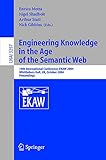Engineering Knowledge in the Age of the Semantic Web [electronic resource] : 14th International Conference, EKAW 2004, Whittlebury Hall, UK, October 5-8, 2004. Proceedings /
Material type: TextSeries: Lecture Notes in Artificial Intelligence ; 3257Publisher: Berlin, Heidelberg : Springer Berlin Heidelberg : Imprint: Springer, 2004Edition: 1st ed. 2004Description: XVIII, 522 p. online resourceContent type:
TextSeries: Lecture Notes in Artificial Intelligence ; 3257Publisher: Berlin, Heidelberg : Springer Berlin Heidelberg : Imprint: Springer, 2004Edition: 1st ed. 2004Description: XVIII, 522 p. online resourceContent type: - text
- computer
- online resource
- 9783540302025
- Artificial intelligence
- Application software
- Information storage and retrieval systems
- Information technology -- Management
- Computer networks
- Artificial Intelligence
- Computer and Information Systems Applications
- Information Storage and Retrieval
- Computer Application in Administrative Data Processing
- Computer Communication Networks
- 006.3 23
- Q334-342
- TA347.A78
Ontologies: Mappings and Translation -- The Theory of Top-Level Ontological Mappings and Its Application to Clinical Trial Protocols -- Generating and Integrating Evidence for Ontology Mappings -- Ontology Translation Approaches for Interoperability: A Case Study with Protégé-2000 and WebODE -- Ontologies: Problems and Applications -- On the Foundations of UML as an Ontology Representation Language -- OWL Pizzas: Practical Experience of Teaching OWL-DL: Common Errors & Common Patterns -- Using a Novel ORM-Based Ontology Modelling Method to Build an Experimental Innovation Router -- Ontology-Based Functional-Knowledge Modeling Methodology and Its Deployment -- Ontologies: Trust and E-learning -- Accuracy of Metrics for Inferring Trust and Reputation in Semantic Web-Based Social Networks -- Semantic Webs for Learning: A Vision and Its Realization -- Ontology Maintenance -- Enhancing Ontological Knowledge Through Ontology Population and Enrichment -- Refactoring Methods for Knowledge Bases -- Applications to Medicine -- Managing Patient Record Instances Using DL-Enabled Formal Concept Analysis -- Medical Ontology and Virtual Staff for a Health Network -- Portals -- A Semantic Portal for the International Affairs Sector -- OntoWeaver-S: Supporting the Design of Knowledge Portals -- Knowledge Acquisition -- Graph-Based Acquisition of Expressive Knowledge -- Incremental Knowledge Acquisition for Improving Probabilistic Search Algorithms -- Parallel Knowledge Base Development by Subject Matter Experts -- Designing a Procedure for the Acquisition of Probability Constraints for Bayesian Networks -- Invented Predicates to Reduce Knowledge Acquisition -- Web Services and Problem Solving Methods -- Extending Semantic-Based Matchmaking via Concept Abduction and Contraction -- Configuration of Web Services asParametric Design -- Knowledge Modelling for Deductive Web Mining -- On the Knowledge Level of an On-line Shop Assistant -- A Customer Notification Agent for Financial Overdrawn Using Semantic Web Services -- Aggregating Web Services with Active Invocation and Ensembles of String Distance Metrics -- Search, Browsing and Knowledge Acquisition -- KATS: A Knowledge Acquisition Tool Based on Electronic Document Processing -- SERSE: Searching for Digital Content in Esperonto -- A Topic-Based Browser for Large Online Resources -- Knowledge Formulation for AI Planning -- Short Papers -- ConEditor: Tool to Input and Maintain Constraints -- Adaptive Link Services for the Semantic Web -- Using Case-Based Reasoning to Support Operational Knowledge Management -- A Hybrid Algorithm for Alignment of Concept Hierarchies -- Cultural Heritage Information on the Semantic Web -- Stepper: Annotation and Interactive Stepwise Transformation for Knowledge-Rich Documents -- Knowledge Management and Interactive Learning -- Ontology-Based Semantic Annotations for Biochip Domain -- Toward a Library of Problem-Solving Methods on the Internet -- Supporting Collaboration Through Semantic-Based Workflow and Constraint Solving -- Towards a Knowledge-Aware Office Environment -- Computing Similarity Between XML Documents for XML Mining -- A CBR Driven Genetic Algorithm for Microcalcification Cluster Detection -- Ontology Enrichment Evaluation -- KAFTIE: A New KA Framework for Building Sophisticated Information Extraction Systems -- From Text to Ontology: The Modelling of Economics Events -- Discovering Conceptual Web-Knowledge in Web Documents -- Knowledge Mediation: A Procedure for the Cooperative Construction of Domain Ontologies -- A Framework to Improve Semantic Web Services Discovery and Integration in an E-Gov Knowledge Network -- Knowledge Organisation and Information Retrieval with Galois Lattices -- Acquisition of Causal and Temporal Knowledge in Medical Domains. A Web-Based Approach.
The central themes of the 14th International Conference on Knowledge Engineering and Knowledge Management (EKAW 2004) were ontological engineering and the Semantic Web. These provide the key foundational and delivery mechanisms for building open, Web-based knowledge services. However, consistent with the tradition of EKAW conferences, EKAW 2004 was concerned with all aspects of eliciting, acquiring, modelling and managing knowledge, and its role in the construction of knowledge-intensive systems. Indeed a key aspect of the Knowledge Acquisition Workshops (KAWs) held in the US, Europe and Asia over the past 20 years has been the emphasis on ‘holistic’ knowledge engineering, addressing problem solving, usability, socio-technological factors and knowledge modelling, rather than simply analyzing and designing symbol-level inferential mechanisms. The papers included in this volume are thus drawn from a variety of research areas both at the cutting edge of research in ontologies and the Semantic Web and in the more traditionally grounded areas of knowledge engineering. A Semantic Web service can be seen as the addition of semantic technologies to Web services to produce Web-accessible services that can be described using appropriate ontologies, reasoned about and combined automatically. Since Web services can be seen as Web-accessible computational objects, much of the work in this area is also concerned with problem-solving methods (PSMs).


There are no comments on this title.